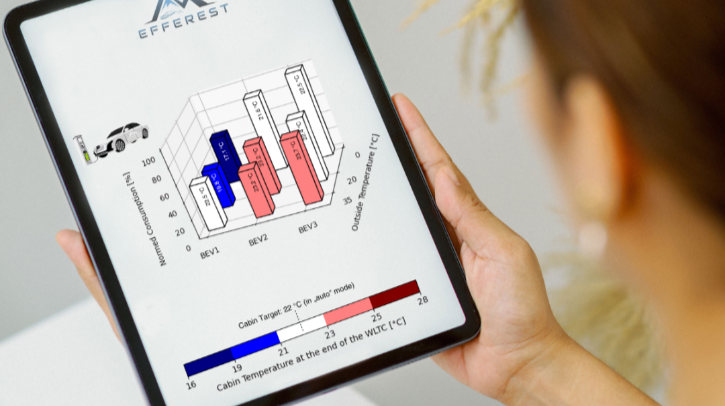The Efferest project has announced “a major milestone” in its goal to advance the use of data to achieve energy-efficient electric vehicle designs, with the comprehensive benchmarking of three electric vehicles as it investigates the trade-off between cabin comfort and energy efficiency.
Efferest (EFFicient user-centric EneRgy managEment SysTems for optimized EVs) is a 36-month Horizon Europe project that is running from 2024-2026. Led by Virtual Vehicle Research with 11 partners from six countries and a €4.9m (US$5.7m) budget, the project has focused on advancing efficient, reliable and sustainable electric vehicle technologies, matching enhanced user acceptance with efficient vehicle operation.
Innovation for sustainable e-mobility
The Efferest project is founded on four key steps.
The first focuses on user-centric development. Efferest designs innovative solutions and control systems to make electric vehicles more affordable, energy-efficient, comfortable and safe. The focus is on individual user needs, supported by novel indicators to assess the overall user experience.
AI-enhanced system design is the second step – the project uses adaptive digital twins, powered by AI and machine learning, to optimize energy management, powertrain thermal management and cabin comfort. The system dynamically adjusts to user preferences, maximizing efficiency and driving comfort.
The third step in the Efferest project is the development of holistic user-centric energy management system control (HUC), based on a multi-layer architecture of predictive and model-based controllers. The HUC enables optimized control of the thermal system and powertrain system based on a digital twin.
In the fourth step, the project uses real-world demonstration as it tests its innovations in a modified series vehicle under real driving conditions and through virtual demonstrations. User-centric driving scenarios are derived from fleet data analysis to ensure a realistic assessment of CO2 reduction potential.
Virtual Vehicle Research project manager Alexander Kospach said, “The focus lies on the systems and components that manage cabin comfort and powertrain performance. These systems will be improved not only individually, but linked together, so that the engineering trade-offs to improve efficiency and affordability will be made in the interest of fulfilling the user’s needs. Efferest will increase the competitiveness of Europe, strengthening industrial leadership in key digital, enabling and emerging technologies to make EVs more attractive for the worldwide mass market.”
Latest results
The project has recently completed a comprehensive benchmarking campaign involving three EVs, carried out under controlled thermal conditions. The campaign investigated the critical trade-off between cabin comfort and energy consumption – an increasingly important factor in EV performance and user satisfaction.
The test results revealed a significant challenge in the current EV landscape: the balance between thermal comfort and energy efficiency varies widely between vehicle models.
BEV1 demonstrated relatively low energy consumption across all temperature ranges. However, at 0°C, it failed to maintain adequate cabin warmth, reaching only an average of 17.1°C by the end of the WLTC cycle. BEV2 and BEV3 offered much better cabin comfort in cold conditions but required substantially higher energy input to do so.
This trade-off highlights a fundamental challenge in electric vehicle design: enhancing comfort often leads to increased energy consumption—and vice versa.
In related news, Toyota to lead £30.3m project to develop lightweight urban EV


